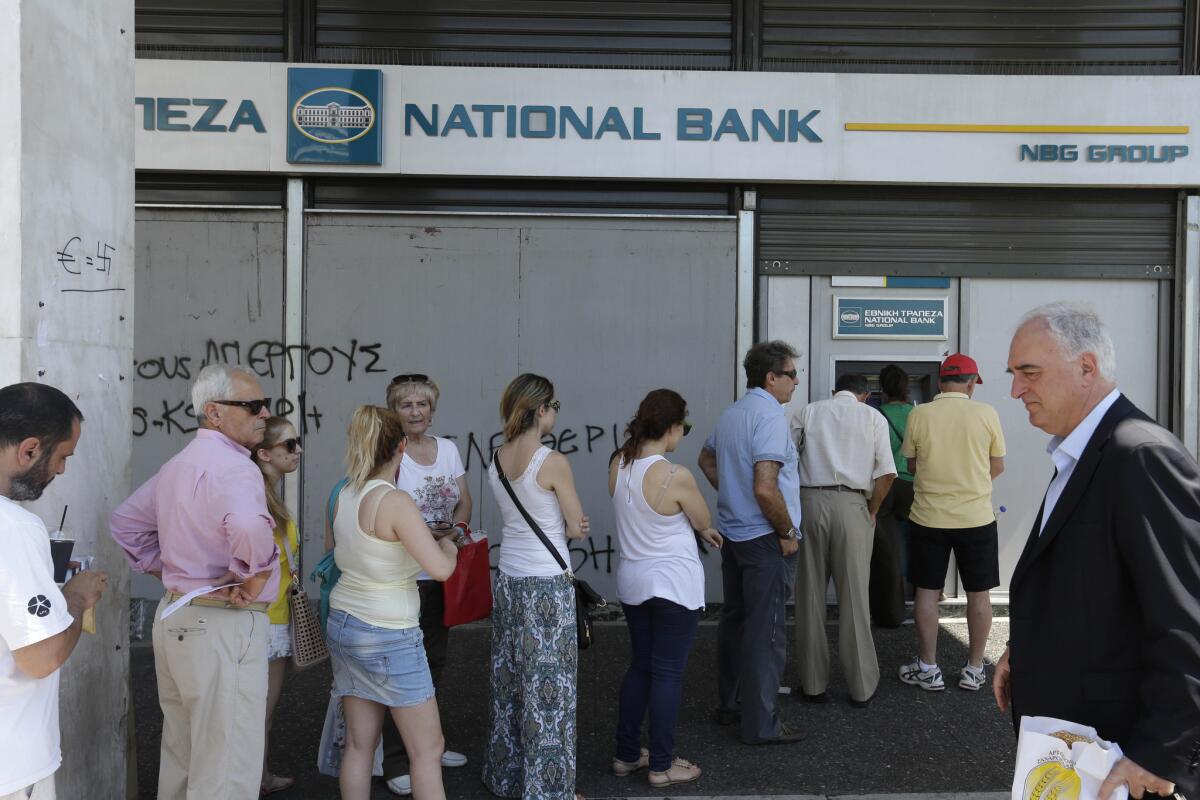What are Greece’s options now?

People line up to use ATM machines in Athens on Monday.
- Share via
Reporting from Washington — Greek voters’ resounding rejection of international creditors’ demands may have strengthened the hand of their prime minister, Alexis Tsipras, who rose to power promising to halt painful austerity measures imposed in the bailout. But what options are open to the Greek leader when he meets with European leaders at an emergency summit Tuesday?
Despite the threat of Greece being forced to abandon the euro currency, Tsipras has said he considers that question to be off the table. And the abrupt departure of his confrontational finance minister, Yanis Varoufakis, a lightning rod in talks with European counterparts, suggests that Athens will tone down its rhetoric, if not demands, and may look for a compromise.
Analysts say European countries still have good reason to prevent an outright Greek collapse and departure from the euro area, even as the odds of a so-called Grexit, or Greek exit, rose sharply after Sunday’s vote.
“Tomorrow night is going to be very critical to the medium and long-term future for Greece,” says Jacob Funk Kirkegaard, a senior fellow at the Peterson Institute for International Economics. “Tsipras needs to use his victory in a smart and deliberate manner – and not overreach.”
• If Tsipras walks into Tuesday’s summit insisting on debt relief but no pension cuts, tax increases or other reforms, it could be a short meeting. The international bailout for Greece was conditioned on Athens making structural reforms to get its finances in order, and Eurozone leaders aren’t willing to give Greece a pass on what many in Europe consider years of Athens’ profligate ways. Eurozone leaders see it as a dangerous precedent that could encourage other insurgent members to follow suit.
• Failure to present a credible bailout proposal, or something that offers hope of a deal, is likely to push the European Central Bank to reconsider whether to keep giving Greek banks emergency funds to stay afloat. Meeting Monday, the ECB board decided to leave the level of its support to Greek banks unchanged, waiting for clearer political signals from European leaders. But the ECB will certainly cut off Greece’s life support if Athens misses a $3.46-billion bond payment due to the ECB on July 20.
• If Tsipras offers a proposal acceptable to Germany and other European leaders, Greece could work out a deal that will give it additional debt relief. With Greece’s economy in tatters and the human suffering having reached epidemic proportions – unemployment has topped 25% and more than 50% for youth – France and Italy are among those who appear willing to give Athens at least more time to meet fiscal targets.
• Either way, Greek banks, which were closed last week except for limited withdrawals, aren’t likely to reopen this week. It may be months before they resume normal operations. But a compromise would help stabilize conditions fairly quickly as the ECB opens the emergency spigot and more calm returns to Greek financial markets.
Twitter: @dleelatimes
More to Read
Sign up for Essential California
The most important California stories and recommendations in your inbox every morning.
You may occasionally receive promotional content from the Los Angeles Times.












